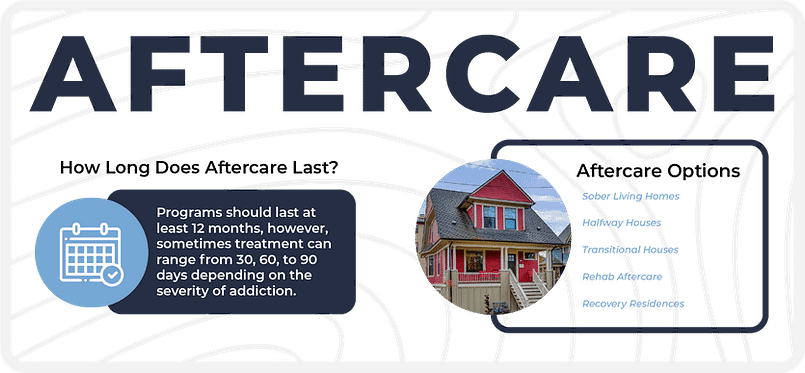Your therapists and counselors will personalize your aftercare planning to your specific requirements since everyone needs something a little different in recovery. For example, one of the leading causes of relapse is an untreated dual diagnosis. Because of this, the professionals at the addiction treatment program facility you choose will add follow-up care to your aftercare regimen. You may also require additional therapy or doctor’s appointments to improve your health. Depending on your personal situation, it also may be a good idea to find a sober living home once you leave.

Healing Begins Here

Why is an Aftercare Program Necessary After Rehab?
Through a wide range of treatment methods, clients learn what their triggers are and how to overcome them. Many of these therapies are like training wheels while the person is in treatment. The goal is that once individuals are ready to finish treatment, they can continue using the tools they’ve learned. Some of the common addiction therapy services a client will go through include:
- Individual therapy
- Group therapy
- Cognitive Behavioral Therapy (CBT)
- Motivational Interviewing
- Dialectical Behavioral Therapy (DBT)
Aftercare and Sober Living Options in Oregon
These are group homes for those recovering from drug or alcohol addiction. Most of these homes are privately owned and they provide a substance-free environment that promotes healthy habits and continued sobriety.
Halfway houses are another type of sober living option, often government-funded, that provides transitional housing for individuals recovering from addiction. They offer a structured environment that helps residents transition back into society while maintaining their sobriety.
These facilities, sometimes referred to as sober living programs or halfway houses, provide housing and support for individuals after treatment. The length of stay in such a facility can vary depending on individual needs.
Some rehab centers offer aftercare programs where individuals can live after receiving treatment. Choosing the right aftercare option can significantly support recovery efforts.
These are also referred to as sober living homes or transitional living arrangements. They can be a step down from intensive treatment programs and provide a supportive environment for those in recovery.

There are also those who have a toxic living environment and are at a high risk of relapse if they move home too soon. This can make a sober living option much more appealing so individuals have the opportunity to practice their new skills in a less risky environment. Sober living in conjunction with outpatient addiction treatment can make the transition back to normal life much smoother as people receive additional support.
The Benefits of Aftercare Support After Treatment

Structure and Routine
These programs often provide a structured environment that helps residents maintain regular schedules, which is crucial in the early stages of recovery.

Supportive Community
Living with others who are also in recovery can create a strong sense of community and mutual support. This can provide motivation and encouragement, which can significantly aid in the recovery process.

Accountability
Sober living homes often have rules and guidelines that residents must follow, such as maintaining sobriety and attending meetings or therapy sessions. This accountability can be highly beneficial for maintaining sobriety.

Safe Environment
For individuals in recovery, it’s crucial to stay in an environment free from drugs or alcohol. Sober living homes provide this safe and substance-free environment.

Transition Assistance
Aftercare programs can help individuals transition back into society while maintaining their sobriety. They can provide assistance with finding employment, securing housing, and other aspects of reintegration.

Continued Therapy and Counseling
Many aftercare programs continue to provide therapy and counseling services to residents. This ongoing support can be very beneficial for long-term recovery.
Remember, the effectiveness of aftercare programs and sober living homes can vary based on individual circumstances, so it’s important to research and consider personal needs when choosing a program.

Aftercare Options for Individuals with Dual Diagnosis
Some people take different non-narcotic medications for mental illness. Additionally, there are some people who stay sober long enough to see their symptoms of mental illness begin to disappear. As a person stays free of substance use, the chemicals in his or her brain begin to balance more each day. Some people can come off the medications completely after a long period of sobriety.
Others may require ongoing adjustments to their medication regimen. Individuals suffering from more serious mental illnesses like bipolar disorder, schizophrenia, or OCD may need to continue to try new medications or make adjustments to their current dosing. For many suffering from mental health conditions, medication management will be necessary to manage mental health symptoms in recovery.
Who Qualifies for Aftercare Programs?

Completion of a Treatment Program
Many aftercare programs require that individuals have completed a primary treatment program such as detox, residential treatment, or outpatient treatment.

Commitment to Sobriety
Individuals are often required to demonstrate a strong commitment to maintaining their sobriety. This can involve adhering to house rules, participating in group meetings, and avoiding substance use.

Age and Gender
Some programs may be gender-specific or age-specific. For example, there are sober living homes specifically for men, women, young adults, or older adults.

Ability to Pay
While some programs receive government funding or donations and can offer reduced-cost or free services, others require residents to pay out-of-pocket. The cost can vary widely, so it’s important to inquire about this upfront.

Health Status
Depending on the level of support provided, some programs may require that individuals are in stable physical and mental health.
It’s important to note that these are general criteria and can vary greatly from one program to another. Always reach out to individual programs for their specific qualifications.
How Long Does Rehab Aftercare Last?
The most intense outpatient treatments, like Partial Hospitalization Programs (PHP), often include services five days a week. Additionally, certain research suggests that aftercare programs should ideally last at least 12 months to be effective.
However, it’s important to note that the duration of treatment can range from 30, 60, and 90 days to extended periods in sober living homes, based on each patient’s specific needs. In some cases, aftercare programs can last from a few months to the rest of one’s life.
Therefore, the length of an aftercare program is highly dependent on the individual’s recovery progress, personal circumstances, and the specific program’s structure.

Our Portland Oregon Aftercare Program
Whether you’re making the first steps toward recovery or are ready to execute your post-rehab aftercare plan, Crestview Recovery can help. Contact our Oregon addiction treatment team today to learn more!





















